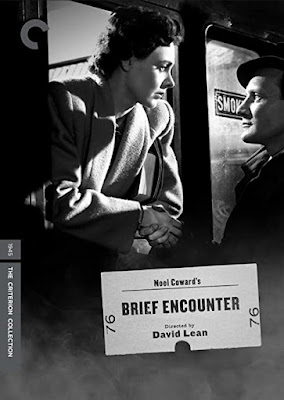Brief Encounter is a relatively short (of course!) British film released in 1945, but reflecting the period before World War II wrenched English domestic life asunder. Several names associated with the film may seem, to the modern movie-goer. to be out of place. Noel Coward, on whose short play Brief Encounter was based, is usually associated with upper-class wit and martinis extra dry. Director David Lean is revered for his towering wide-screen epics, among them Lawrence of Arabia and Doctor Zhivago. Male lead Trevor Howard, just starting his acting career in 1945, became known for playing authority figures, like Napoleon, Captain Bligh and a variety of popes and military men. Romantic roles were never his specialty.
And yet this relatively modest black & white film is cherished by those who adore a good love story with a stiff-upper-lip ending. It took me years to catch up with it on video, but I’m glad I did. I’m also glad I listened to the post-film commentary, which gave me a great deal to contemplate. Though I’ve read a fair number of Noel Coward plays (among them the ultra-sophisticated Private Lives and Design for Living), I don’t know Still Life, which provided the source material for Brief Encounter. Apparently its trajectory is much the same as Brief Encounter: a youngish wife and mother falls passionately in love with a married doctor she meets by chance in the lunch room of a suburban railway station. Their serious but ultimately doomed romance is played off against the comic flirtation of another couple, a lower-class ticket collector and the not-so-youthful woman who runs the railway buffet. In its stage premiere the central roles were played by Coward himself and his longtime close friend, Gertrude Lawrence. Audiences loved it, particularly its heart-in-the-throat ending in which a stab at a passionate farewell is disrupted by the unexpected appearance of the leading lady’s chatty female friend.
I learned from the commentary that Coward’s play is balanced between the emotions of the wife, restless in an affectionate but dull marriage, and the doctor who falls hard for her. Both characters, while luxuriating in the passion they feel for one another, have no desire to overthrow their solid domestic arrangements. It’s hardly a surprise that middle-class mores ultimately win out: they’re English, after all.
In the film version, however, we’re entirely in the head of Laura, played by Celia Johnson. I don’t know her work in other films, but here Johnson has the ability to look plain, even mousy, in some scenes, but absolutely radiant in others. When she joyously laughs at her lover’s antics, it’s hard to imagine anyone more adorable. At home she’s the dutiful wife and mother, knitting by the fire as her husband works a crossword puzzle. But when her weekly trip to a neighboring town to do some shopping and see a movie unexpectedly turns into a series of trysts with a romantically-inclined man of medicine, she becomes quite a different person.
Though I loved seeing Laura blossom as romance comes her way, I was never so sure about her romantic partner. Is he as fully swept away by forbidden love as she is? We see Laura’s habits—the Rachmaninoff concerto she listens to on the radio, the romantic novels she borrows from the lending library—and understand full well her dreams. But Howard’s Alec? His home life is withheld from us, and we wonder how the good doctor manages to consistently shirk his hospital duties. He’s the active one in moving the romance forward. Is he, perhaps, simply looking for a good lay?


Can’t comment on your essay, am in the dark, but, was watching a documentary about Don Rickles and who showed up? You know, it was Roger! They showed Rickles in some X-Ray eyes movie masterpiece. Funny. PS what did think of the class guest list sampling I wrote for you below the last movie essay?
ReplyDeleteActually, X: The Man With X-Ray Eyes, is a good movie -- very imaginative and one of Roger's early best. And Rickles does well in it. Thanks for alerting me to the amazing guest list you mentioned in your previous comments.
ReplyDelete